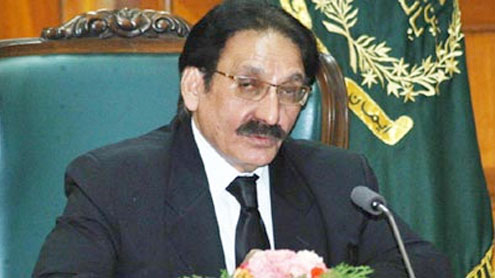 Chief Justice (CJ) Iftikhar Muhammad Chaudhry made some very important points regarding the armed forces and unconstitutional moves while talking to a delegation of the National Defence University (NDU).
Chief Justice (CJ) Iftikhar Muhammad Chaudhry made some very important points regarding the armed forces and unconstitutional moves while talking to a delegation of the National Defence University (NDU).
“Any action of the armed forces taken without a direction by the federal government will be unconstitutional, illegal, void ab initio and consequently of no legal effect,” said CJ Chaudhry. He said that any unconstitutional step taken by the military comes into the ambit of sedition, and Article 6 would be used against violations of the constitution and the law. Referring to Article 244 of the constitution, the CJ said, “This is a conscious effort by the framers of the constitution to restrict the role of the armed forces to defending the borders of the country and to safeguard the constitution from any adventurism.”
Pakistan Muslim League-Nawaz (PML-N) chief Mian Nawaz Sharif also made a similar point on Saturday. Mian sahib said that his party would not tolerate any unconstitutional step, including a direct military coup, since nations all over the world only made progress under the democratic system.
“The right to rule must remain with the people of Pakistan,” said the PML-N chief. Both the chief justice of Pakistan and the leader of the second largest mainstream party made it clear that democracy is important for Pakistan and all institutions should work within their constitutional parameters. Thus it was a bit surprising to see the prime minister taking a completely different tangent.
On Sunday, Prime Minister Gilani Prime said that unconstitutional steps of the opposition against an elected government would not be tolerated.As far as the PML-N, the main opposition party in the National Assembly is concerned, it has not tried to sabotage the democratic process ever since the Pakistan People’s Party (PPP) came to power in 2008. In fact, the PML-N has been accused of being ‘soft’ on the ruling coalition.
Mr Sharif has made it quite clear in the past why he does not want to disrupt the democratic system; he does not want to repeat the mistakes of the 1990s.His stance on the civil-military imbalance is something the military establishment perceives as a ‘threat’ to their dominance. For almost half of Pakistan’s existence we have been directly ruled by military dictators: 11 years by General Ayub Khan, two years by General Yahya Khan, 11 years by General Ziaul Haq and nine years by General Musharraf. Apart from Zulfikar Ali Bhutto’s government, no other democratically elected parliament has completed its tenure. From 1988-99, four democratic governments came to power but not one of them was able to complete its tenure due to political nitpicking by the opposition, finally resulting in a military coup.
With such a powerful military ruling the roost, democratic governments have mostly been weak, including the present incumbents. Unless and until we allow democracy to take root in the country, we cannot expect an end to the power the military wields in our politics, security and foreign affairs. Religious extremism, militancy, terrorism are all an extension of the military’s vested interest. Intolerance has permeated our society due to their shortsighted policies.
It is time to put an end to all this damaging military intervention in affairs that should not be their concern and we can only do that by continuing with democratic dispensations. Peace, progress and prosperity can only follow once democracy is strengthened. A pluralistic, secular and democratic Pakistan is in the interests of not just our own people, but the entire region. – Nation












